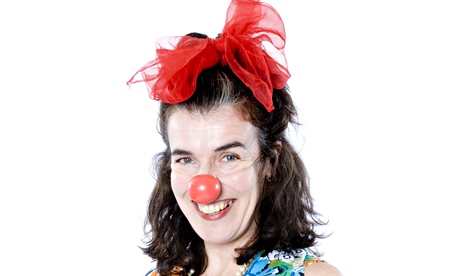
The word "clown" doesn't spring to mind when you meet Zoe Darbyshire. In her early 50s, she is warm and eloquent. She trained at the Royal Scottish Academy of Drama and Music in Glasgow and Ecole Philippe Gaulier, where she studied clowning. But what she does now couldn't be further from the TV acting gigs of her peers. She is an "Elderflower", a specially trained practitioner who uses clowning techniques to enhance the quality of life of dementia patients.
"We're not party clowns," Darbyshire is quick to explain. "It's not as simple as sticking on a red nose and falling over. We're character clowns. People are more used to seeing clowns in the wards of children's hospitals, but this is a different concept. Initially, there was some resistance to the red noses. But without them, people didn't really understand who we were. In certain dementias, some colours can fade – but red tends to retain, and the nose helps us establish eye contact. Red noses are also a universal symbol for 'play'."
For Darbyshire, meeting Magdalena Schamberger of arts-in-health charity Hearts & Minds was serendipitous. "It was 2004 and the Elderflowers were establishing themselves. It felt perfect for me: I wasn't particularly driven, performance-wise, but I was attracted to using my skills to work in healthcare, where I could be part of taking the arts to people who wouldn't normally have direct access".
So what does Zoe actually do when she visits a ward or care home? "Elderflowers always work in pairs, in character as brother and sister or cousins. The people we visit seem to understand the concept, and that helps make them feel more safe and comfortable". At the start of each session, the Elderflowers get referrals – as much information as possible about the individual. "Some people don't like to be touched, and in some instances, we have to be aware of overstimulating. We find out as much as we can because everyone is unique."
"We make a plan based on this, then our session will often start quite indirectly: some kind of interaction or scenario between the two Elderflowers, so we can gauge who is interested immediately and with whom we need to take a gentler approach. Visits can involve any topic from Shakespeare to poetry, gardening to cooking. However it evolves, we leave openings to respond. There is laughter, gentle slapstick, music, object play – but, crucially, we're engaging with the patients, not performing at them."
So what sort of reaction do they get? "We work with people from assessment right through to end of life, so responses vary enormously" says Darbyshire. "Sometimes we get told in no uncertain terms to go away, which we respect and obey. But most of the time, it can be anything from laughter and playfulness to a small change in the way the person is breathing. We have times when a person will disclose something painful and there can be tears, but that has its positive side too. I remember one woman who told me she'd lost a baby many years ago. We listen, acknowledge, then gently move the conversation forward."
"People with dementia are often in a situation where all they're doing is taking – it's all that's possible. We try to create a scenario where they can give something back. They are given some sense of control and value – and so are the relatives. Some of the healthcare staff can take longer to warm to the process, but mostly come round when they see we're providing one-to-one engagement and stimulation – something they are often frustrated about not having time to do."
"So much of what is done for and with people who have dementia actually feels like something is being done 'to' the people – the Elderflowers are quite different", explains Professor June Andrews at the Dementia Services Development Centre at the University of Stirling. "And while it is entertaining, that is almost a side effect. What these artists are doing is using enhanced communication to get close to people, when others have just stopped trying. Patients who have not spoken for ages will respond to the Elderflowers. That is not accidental."
Has Darbyshire ever felt threatened? "I remember one unit we visited with eight really challenging men. The nurses were convinced we'd get beaten up. But our approach is open and with no agenda, and the gentlemen sensed that. We don't have to do personal care, and we're not their family – we are new friends who need their help with something."
Schamberger, who is artistic director and CEO of Hearts & Minds, has just received a Breakthrough award from the Paul Hamlyn Foundation, and with it a grant of £250,000 to further her work. Asked why there is a need for Elderflowers like Darbyshire, she explains that "the number of people in the UK with Alzheimer's is set to double in the next 40 years. We are not going to change these figures – instead, we can strive to increase communication and the wellbeing of people living with dementia, by ensuring that they are given a chance to continue to be recognised, to contribute and remain included and involved in life."
So how does Zoe explain to friends what she does as an Elderflower? "If someone asks me, I usually say, 'How long have you got?'" But once I've had a chance to explain, they're fascinated. I'd like more people to understand how we work, so that carers and relatives can discover another gentle, playful way to communicate with their loved ones. When my own father was diagnosed with dementia, I felt better equipped to know how to be with him because of what I do. We need that – we need more understanding."

